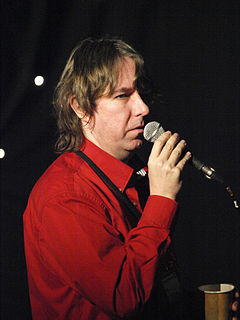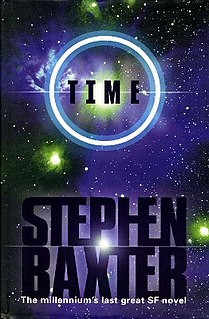The Fermi paradox, named after Italian-American physicist Enrico Fermi, is the apparent contradiction between the lack of evidence for extraterrestrial civilizations and various high estimates for their probability.
Superluminal communication is a hypothetical process in which information is sent at faster-than-light (FTL) speeds. The current scientific consensus is that faster-than-light communication is not possible, and to date it has not been achieved in any experiment.

Gregory Dale "Greg" Bear is an American writer and illustrator best known for science fiction. His work has covered themes of galactic conflict, artificial universes, consciousness and cultural practices, and accelerated evolution. His most recent work is the War Dogs trilogy. Greg Bear has written over 50 books in total. Greg Bear was also one of the five co-founders of the San Diego Comic-Con.

Stephen Baxter is an English hard science fiction author. He has degrees in mathematics and engineering.

The Foundation series is a science fiction book series written by American author Isaac Asimov. First published as a series of short stories in 1942–50, and subsequently in three collections in 1951–53, for thirty years the series was a trilogy: Foundation, Foundation and Empire, and Second Foundation. It won the one-time Hugo Award for "Best All-Time Series" in 1966. Asimov began adding new volumes in 1981, with two sequels: Foundation's Edge and Foundation and Earth, and two prequels: Prelude to Foundation and Forward the Foundation. The additions made reference to events in Asimov's Robot and Empire series, indicating that they were also set in the same fictional universe.

The Robot series is a series of 37 science fiction short stories and six novels by American writer Isaac Asimov, featuring positronic robots.
The Galactic Empire series is a science fiction sequence of three of Isaac Asimov's earliest novels, and extended by one short story. They are connected by their early place in his published works and chronological placement within his overarching Foundation Universe, set around the rise of Asimov's Galactic Empire, between the Robot and Foundation series to which they were linked in Asimov's later novels.

Alastair Preston Reynolds is a British science fiction author. He specialises in hard science fiction and space opera. He spent his early years in Cornwall, moved back to Wales before going to Newcastle University, where he read physics and astronomy. Afterwards, he earned a PhD in astrophysics from the University of St Andrews. In 1991, he moved to Noordwijk in the Netherlands where he met his wife Josette. There, he worked for the European Space Research and Technology Centre until 2004 when he left to pursue writing full-time. He returned to Wales in 2008 and lives near Cardiff.

The Hyperion Cantos is a series of science fiction novels by Dan Simmons. The title was originally used for the collection of the first pair of books in the series, Hyperion and The Fall of Hyperion, and later came to refer to the overall storyline, including Endymion, The Rise of Endymion, and a number of short stories. More narrowly, inside the fictional storyline, after the first volume, the Hyperion Cantos is an epic poem written by the character Martin Silenus covering in verse form the events of the first book.

Phase Space is a 2003 science fiction collection by British writer Stephen Baxter, containing twenty-three thematically linked stories, in which the human relationship with the universe is explored: whether humanity is truly alone in the universe, if there are other intelligent species, if these have turned their backs on us, or if expansion itself is destined to fail.
The idea of self-replicating spacecraft has been applied – in theory – to several distinct "tasks". The particular variant of this idea applied to the idea of space exploration is known as a von Neumann probe, after being conceived by mathematician John von Neumann. Other variants include the Berserker and an automated terraforming seeder ship.
The zoo hypothesis speculates on the assumed behavior and existence of technically-advanced extraterrestrial life and the reasons they refrain from contacting Earth. It is one of many theoretical explanations for the Fermi paradox. The hypothesis is that alien life intentionally avoids communication with Earth, and one of its main interpretations is that it does so to allow for natural evolution and sociocultural development, avoiding interplanetary contamination, similarly to people observing animals at a zoo. The hypothesis seeks to explain the apparent absence of extraterrestrial life despite its generally accepted plausibility and hence the reasonable expectation of its existence. A variant on the zoo hypothesis suggested by Ball is the laboratory hypothesis, where humanity is being subjected to experiments, with the Earth being a giant laboratory.

Manifold: Time is a 1999 science fiction novel by Stephen Baxter. It is the first of Baxter's Manifold Trilogy, although the books can be read in any order because the series takes place in a multiverse.

Manifold: Origin (2001) is a science fiction novel by British author Stephen Baxter, the third instalment in the Manifold Trilogy. As with the other books, the protagonist Reid Malenfant is put through a scenario dealing with the Fermi paradox. Each novel is an alternative scenario rather than a chronological sequel, and does not occur in the same universe. Manifold: Origin explores primate evolution to create an explanation for our lack of contact with other intelligent species.

Manifold: Space is a science fiction book by British author Stephen Baxter, first published in the United Kingdom in 2000, then released in the United States in 2001. It is the second book of the Manifold series and examines another possible solution to the Fermi paradox. Although it is in no sense a sequel to the first book it contains a number of the same characters, notably protagonist Reid Malenfant, and similar artefacts. The Manifold series contains four books, Manifold: Time, Manifold: Space, Manifold: Origin, and Phase Space.
Destiny's Children is a science-fiction series by Stephen Baxter. It takes place within his larger series, the Xeelee Sequence. Like his previous Manifold Trilogy, the books are not direct sequels to one another, but are instead thematically linked by the appearance of concepts, themes, and sometimes characters in multiple books. Examples of this include:

American writer C. J. Cherryh's career began with publication of her first books in 1976, Gate of Ivrel and Brothers of Earth. She has been a prolific science fiction and fantasy author since then, publishing over 80 novels, short-story compilations, with continuing production as her blog attests. Ms. Cherryh has received the Hugo and Locus Awards for some of her novels.

Neocatastrophism is the hypothesis that life-exterminating events such as gamma-ray bursts have acted as a galactic regulation mechanism in the Milky Way upon the emergence of complex life in its habitable zone. It is proposed as an explanation of Fermi's paradox since it provides a mechanism which would have delayed the otherwise expected advent of intelligent beings in the local galaxy nearby to Earth. This is an avenue to explain why none so far have been detected by humans.
"The Crystal Spheres" is a science fiction short story by American writer David Brin, originally published in the January 1984 issue of Analog and collected in The River of Time. It won the Hugo Award for Best Short Story 1985. In it, Brin presents an explanation for the Fermi Paradox.
The Expanse is a series of science fiction novels by James S. A. Corey, the joint pen name of authors Daniel Abraham and Ty Franck. The first novel, Leviathan Wakes, was nominated for the Hugo Award for Best Novel in 2012. The complete series was nominated for the Hugo Award for Best Series in 2017. It later won, following its second nomination for the same award in 2020.











